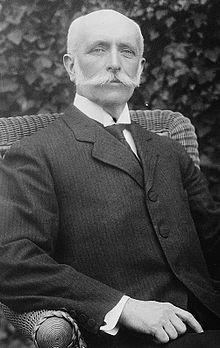José Yves Limantour
| José Yves Limantour | |
|---|---|

José Yves Limantour in 1910
|
|
| Mexican Secretary of Finance | |
|
In office 1893–1911 |
|
| President | Porfirio Díaz |
| Preceded by | Matías Romero |
| Succeeded by | Ernesto Madero |
| Personal details | |
| Born |
José Yves Limantour y Marquet 26 December 1854 Mexico City |
| Died | 26 August 1935 (aged 80) Paris, France |
| Resting place | Montmartre Cemetery |
| Nationality | Mexican |
| Spouse(s) | María Cañas y Buch (m. 1880) |
| Parents | Joseph Yves Limantour and Adèle Marquet |
José Yves Limantour y Marquet (26 December 1854 – 26 August 1935) was a Mexican financier who served as Secretary of the Finance of Mexico from 1893 until the fall of the Porfirio Díaz regime in 1911. Limantour established the gold standard in Mexico, suspending free coinage of silver, and mandating only government coins be used. He secured the national debt in 1899 with a consortium of foreign banks, and at the time of the outbreak of the Revolution, Mexico was on strong financial basis. Before the Mexican Revolution he was widely seen, along General Bernardo Reyes, as one of the stronger candidates to succeed President Díaz.
José Limantour was born on 26 December 1854 in Mexico City, Mexico. His parents were Joseph Yves Limantour, a ship captain from Brittany, France, and Adèle Marquet, who came from Bordeaux. The Limantour family grew wealthy through land speculation in Baja California and Mexico City when the Liberals seized church property, redistributing land. After private primary schooling in Mexico, Limantour went to Europe at 14. There he attended the National Preparatory School. He received a law degree with specialized studies in economics and management. He returned to Mexico at the inception of Porfiriato, teaching at the School of Commerce and the National School of Jurisprudence. He also wrote for the legal journal El Foro (The Forum) from 1877 to 1882.
After the death of Matías Romero Rubio in 1895, Limantour was considered the political leader of the technocratic advisers to President Díaz known as científicos ("the scientists"), who were highly educated and wanted expanded intellectualism and prosperity in Mexico. They supported the Díaz regime because of its efforts to modernize the country, yet they also wanted expanded freedom.
As Secretary of Finance, he expanded foreign investment into Mexico, supported free trade, and balanced the budget for the first time and generated a budget surplus by 1894. However, even with the economic prosperity of Mexican business, the common people of the country suffered because of the rising cost of food.
Towards the end of the Díaz regime, the president felt that Limantour was becoming too powerful, and thus he sent him to Europe to negotiate loans. Then, with the pending military collapse of the Díaz regime, he returned to Mexico and encouraged Díaz to resign. He negotiated Díaz's 1911 exit from Mexico into exile in Paris.
...
Wikipedia
